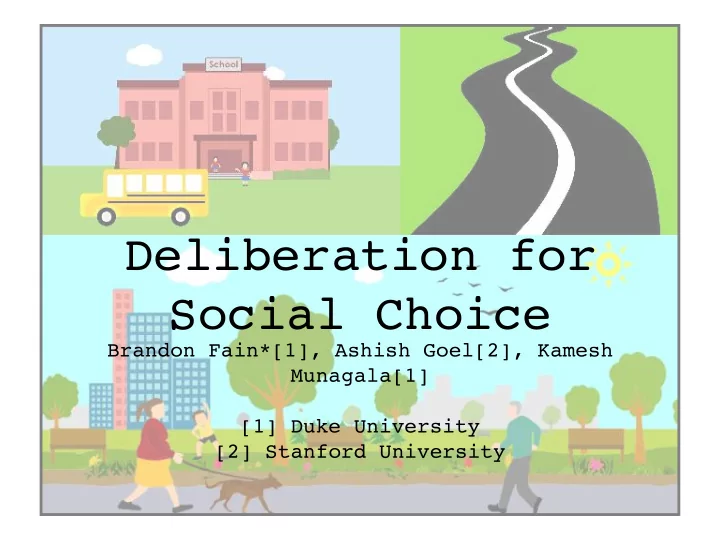

Deliberation for Social Choice Brandon Fain*[1], Ashish Goel[2], Kamesh Munagala[1] [1] Duke University [2] Stanford University
Voting in Complex Spaces • What if: • The space of outcomes is large? • No preference structure is known a priori? • We can always run plurality vote, but…
The Failure of Plurality
Goals • Desiderata: A. The algorithm (mechanism) designer does not need to understand the decision space. B. We can prove guarantees on the quality of outcomes under analytical models. C. In particular, we should beat random dictatorship.
Sequential Deliberation • N := set of agents. Initialize o0 <— Favorite outcome of a random agent. • For rounds from t=1 to t=T: • ut ~ Uniform( N ) and vt ~ Uniform( N ) • ot <— Bargain({ut, vt}, ot-1) • Output oT.
Median Graphs Median Graph Not Median Graph Trees Triangles • • • Hypercubes • Disconnected Grids • Has a Condorcet winner
Results 1. On a median graph, Nash bargaining between agents u and v with bliss points pu and pv using disagreement outcome o finds the median of pu,pv,o. 2. We can analytically compute bounds on approximating the social cost minimizer by embedding onto the hypercube. 3. All agents bargaining truthfully representing their bliss point is a subgame perfect Nash equilibrium of the extensive form game defined by sequential bargaining.
Bounds Welfare Random Random Sequential Approximation Dictatorship Deliberation Deliberation 2 1.316 1.208 Upper Bound Lower Bound 2 1.316 1.125
Acknowledgements • Collaborators Kamesh Munagala (Duke University) and Ashish Goel (Stanford University). • Supported by NSF grants CCF-1408784 and IIS-1447554
Thanks! • Questions?
Deliberation Alice Red Yellow Blue Green Dist. to 0 1 2 1 Alice Dist. to 1 2 1 0 Bob Disagreement Bob alternative Red Yellow Blue Green Red (0, 1) (2, 1) (2, 1) (2, 1) Bargain({Alice,Bob}, Blue) Yellow (2, 1) (1, 2) (2, 1) (2, 1) = Green Blue (2, 1) (2, 1) (2, 1) (2, 1) Green (2, 1) (2, 1) (2, 1) (1, 0)
Recommend
More recommend